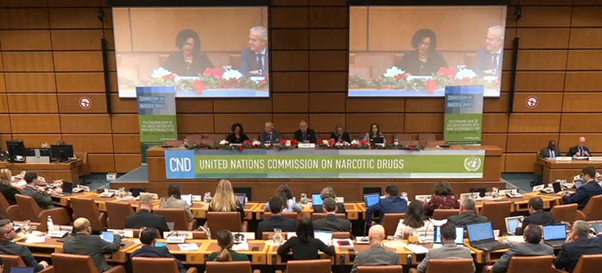INCB takes part in Commission on Narcotic Drugs thematic discussions and reconvened session
VIENNA, 8 December 2023 - The International Narcotics Control Board took part in the Commission on Narcotic Drugs thematic discussions and reconvened session held from 4 to 8 December 2023. The thematic discussions were a continuation of the stock-taking exercise in preparation for the 2024 mid-term review by the Commission on the implementation of all international drug policy commitments following-up to the 2019 Ministerial Declaration.
The INCB Second Vice-President, Dr. Zukiswa Zingela, participated in the opening segment of the thematic discussions on 4 December, highlighting that the issues to be discussed were crucial to the health and wellbeing of all and reiterating the commitment of INCB to supporting Member States in implementing the three drug control conventions. Reflecting on her experience as a health professional from Africa, Dr. Zingela drew attention to the need to address disparities between regions and countries, and also within countries between urban and rural communities, and to translate the drug policy commitments and Sustainable Development Goals into reality to make a positive difference to the lives of people.
Also on 4 December, Dr. Zingela participated in a side event commemorating World AIDS Day (1 December) themed "Let Communities Lead" together with H.E. Ms. Caroline Vermeulen, Permanent Representative of Belgium and Mr. Jean-Luc Lemahieu, UNODC Director, Division for Policy Analysis and Public Affairs.
On 5 December, Dr. Zingela presented INCB's views on the health and regulatory challenges posed by synthetic opioids and the non-medical use of synthetic drugs, highlighting the threat posed by the exploitation of legitimate manufacturing, marketing, movement and monetization sectors by traffickers seeking to undermine the regulatory mechanisms put in place to protect society. The Second Vice-President touched upon the support provided to national authorities under the INCB GRIDS Programme, and also noted that a number of these issues were addressed in the thematic chapter of the Board's annual report for 2023, which focuses on the role of the Internet, including social media, in drug trafficking and use.
On 6 December, Dr. Zingela made an intervention on the low to non-existent availability of internationally controlled substances for medical and scientific purposes, recalling that this issue was the subject of a special supplement released with the Board's Annual Report for 2022 and that INCB had been working extensively on this matter with the previous Chair of CND under the "No Patient Left Behind" initiative. Dr. Zingela outlined the difficulties experienced by many countries in procuring medications containing morphine, even though sufficient quantities of opiate raw materials are reported to be available. The findings of the Board's analysis of the data available to it through Governments' treaty-based reporting were shared, as were the responses from Governments and civil society to the INCB questionnaire on this issue. The Board remained in close cooperation with WHO and UNODC towards improving availability for medical and scientific purposes, which was the topic of a meeting between the three bodies at the margins of the thematic discussions.
Dr. Zingela also participated in the reconvened sixty-sixth session of the Commission on Narcotic Drugs, addressing the Commission on 8 December under item 5 on implementation of the international drug control treaties. Dr. Zingela presented the Board's recommendation to place sixteen precursors of amphetamine-type stimulants and two fentanyl precursors in Table I of the 1988 Convention. The Board had decided to make the recommendation following a thorough assessment of information made available by Governments through INCB questionnaires and Operation Backup, which was conducted to complement the formal information gathering process. Dr. Zingela noted that the Board considered the proposed scheduling of the two series of amphetamine-type stimulants precursors to be a decisive step towards addressing the proliferation of closely related designer precursors with no known legitimate use, and that the proposal also put into practice Commission resolution 65/3 which had, inter alia, invited INCB and Member States to consider derivatives and related chemicals which may readily be converted to or used in place of a controlled precursor during illicit manufacture. The scheduling recommendation will be considered by the Commission during its regular sixty-seventh session in March 2024.
